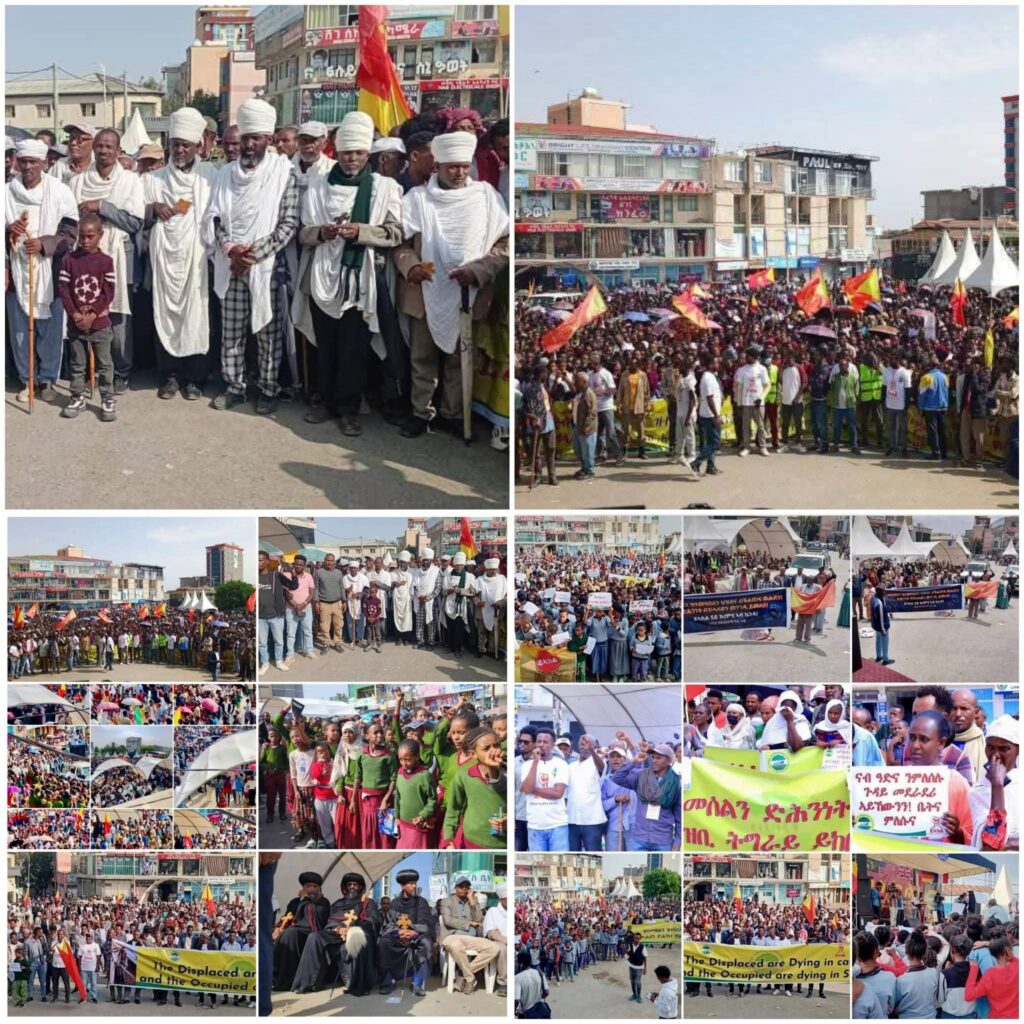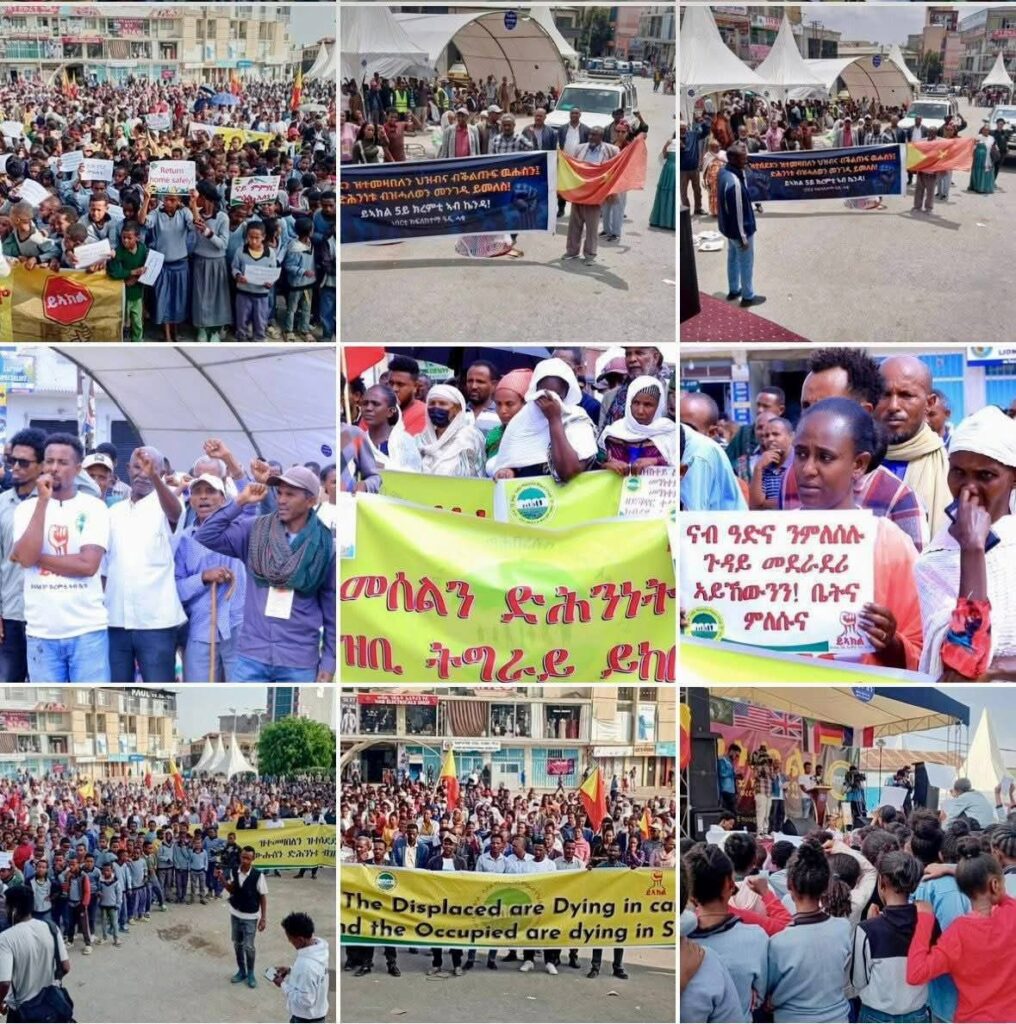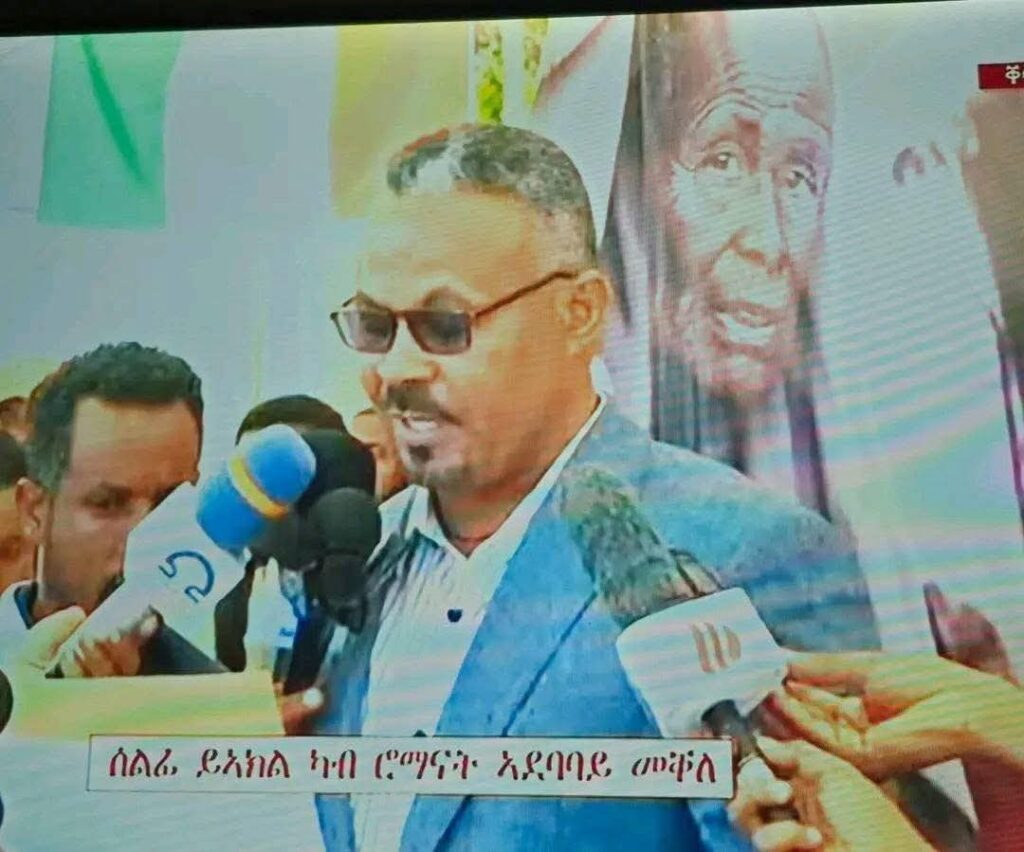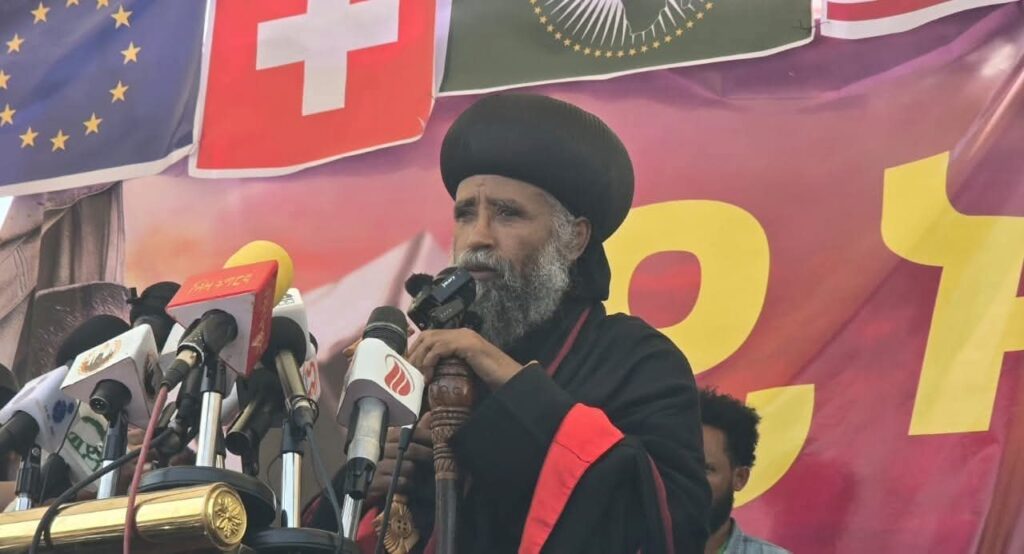Mekelle፡Telaviv, Nairobi, Pretoria, London, (Tigray Herald).
Pretext for Power: Is the TPLF Exploiting IDPs to Justify a New War?
By Tessema Nadew
“No More Plastic Graves”: Mekelle Erupts as Tigray IDPs and Refugees Demand Safe Return, While TPLF Faces Accusations of Weaponizing Displacement
It began with a haunting chant echoing through Mekelle’s Martyrs’ Square:
“We are not statistics. We are survivors. We want to go home.”
Thousands of internally displaced persons (IDPs), refugees, and residents of Mekelle took to the streets in one of the largest rallies Tigray has witnessed since the war ended on paper. Between June 18 and 20, demonstrators flooded both Mekelle and Geneva where members of the diaspora staged a parallel action calling on the Ethiopian government, the Tigray Interim Administration, and the international community to uphold the most basic promise of the 2022 Pretoria Agreement: safe return.
More than a million Tigrayans remain in limbo living in suffocating plastic tents with no access to clean water, stable food supplies, or basic health services. In the past 55 days alone, refugee shelters in Sudan have been burned down six times, leaving thousands without shelter. Daily deaths due to malnutrition, dehydration, and preventable diseases are now being reported from camps in Shire, Adigrat, and Mekelle.
Yet for many protesters, the most bitter betrayal is not from distant governments, but from within.

“This is the biggest call of Tigray that seeks tangible determination to save more than a million innocents,” said one rally organizer in Mekelle. “We are raising our voices not just against occupation, but against political silence and betrayal. We are not echoes of leaders. We are the voice of the displaced.”
Romonat Square: The Epicenter of a Cry for Justice
The decision to shut down public services in Mekelle was not made lightly it was a reflection of how deeply the IDP crisis has pierced every sector of society.
“Today, the city stood still for the truth,” said one university lecturer who joined the rally. “This was not just a protest of the displaced. This was a protest by the entire people of Tigray civil servants, students, elders united in saying: enough.”

Organizers say this rally marks the climax of a long-brewing frustration with both the Ethiopian federal government and the Tigray Interim Administration, which is dominated by the TPLF.
Five Years in Tents, Forgotten by Peace
The Pretoria Agreement, signed in November 2022 between the Ethiopian federal government and the Tigray People’s Liberation Front (TPLF), promised disarmament, humanitarian access, and most critically, the return of IDPs. Nearly three years later, the agreement remains largely unimplemented.
The situation has grown so dire that local civil society groups describe it as “a second death by neglect.” In some camps, children are buried beneath the very plastic sheets they once called shelter. Women walk for hours for a bucket of water. Communicable diseases are spreading. The war may be over, but the suffering has not ended.

In Geneva, protesters outside the UN headquarters carried signs reading “Pretoria = Paper Peace” and “Stop Starvation Diplomacy.”
TPLF’s “Pretext Politics” Under Scrutiny
As the protests spread, so too does a growing wave of criticism targeting the TPLF. While the interim government publicly supports the IDPs’ right to return, many accuse it of deliberately tying the return to broader political conditions particularly the restoration of Western Tigray’s Tplf Cadres in order to delay action and mobilize internal support for a second war.
“They say they’re defending our homeland, but we’ve been homeless for five years,” said Tsirha Gebru, a mother of four displaced from Humera. “We’re not fools. They are using our pain as political fuel.”
According to multiple insiders, the TPLF is conditioning IDP return on regaining full administrative control of western Tigray (Wolkayt) currently occupied by Amhara regional forces. In effect, the return of civilians is being postponed until political and territorial ambitions are met.
Analysts warn that this “sequencing” could serve as a dangerous pretext to reignite hostilities.
“There are credible signs that TPLF leaders are laying the groundwork for another round of war,” said a regional security expert in Nairobi. “And the IDP crisis is being used to build the moral justification. ‘We must return our people home’ becomes a convenient slogan but the method may be military.”
PM Abiy Responds: Return Must Be Peaceful and Sovereign
In response to mounting pressure, Prime Minister Abiy Ahmed this week stated that his government is ready to facilitate the return of IDPs and refugees to “where they rightfully belong.” But he also issued a stark warning to the TPLF.
“Sovereignty is not a bargaining chip,” Abiy said in Addis Ababa during a meeting with opposition parties. “Any collaboration with foreign powers in violation of constitutional order will not be tolerated.”
He was referring to recent reports suggesting covert communications between the TPLF and Eritrean authorities a move that, if true, would represent a radical and controversial shift in regional alliances, especially given Eritrea’s role in the Tigray war.

The Prime Minister accused certain TPLF elements of “practicing unconstitutional movements” and warned that “this is not the way to resolve the suffering of the people.”
A Humanitarian Deadline
With frustration now reaching what demonstrators call a “tolerance threshold,” many are demanding a clear and public timeline including a call for the return of IDPs and refugees by the first week of July 2025.
Human rights groups and Tigrayan civil society organizations have issued statements declaring that if meaningful steps are not taken before July, they will escalate peaceful resistance and expand international campaigns targeting both the federal and interim administrations.
“We cannot continue watching children die in tents while leaders debate borders,” said a spokesperson for the Tsilal Civic society of Western Tigray. “This is a test of moral leadership and so far, everyone is failing.”
From Protest to Movement?
What began as a rally in Mekelle may soon become a global campaign. Tigrayan diaspora networks in Washington, Toronto, London, and Geneva are preparing coordinated events in July under the banner: “Dignity is Not a Precondition.”
The message is clear: displacement is not just a humanitarian failure it is a political choice.
And increasingly, the people of Tigray are choosing to speak for themselves.
“We don’t need more promises,” said a young protester in Mekelle. “We need return. We need peace. And we need it now not after another war.”
Tessema Nadew is a Horn of Africa political analyst and writer focused on transitional justice, post-conflict recovery, and regional security.




